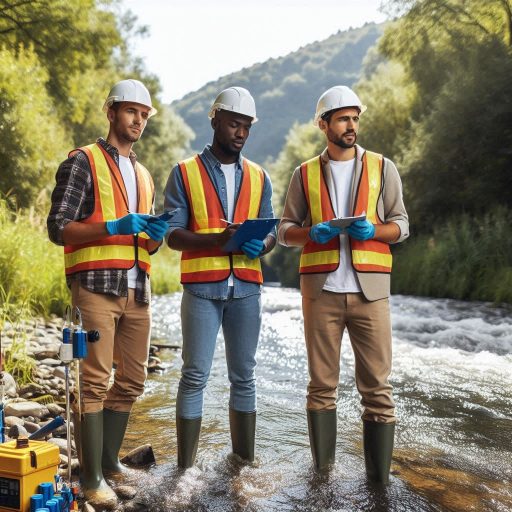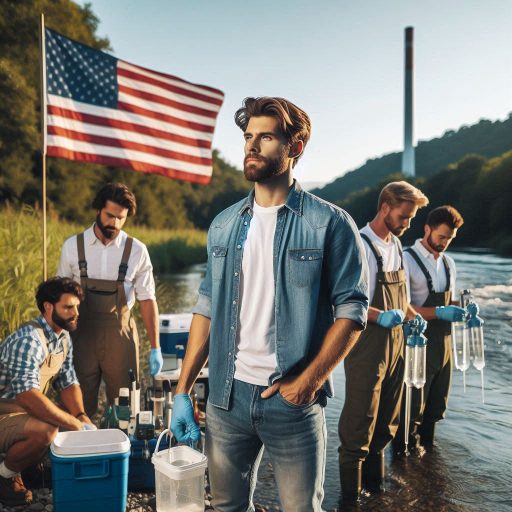Introduction
Hydrology Research Projects Funding and Grants, distribution, and quality to address environmental and water resource challenges.
These projects are critical for understanding water systems and developing sustainable solutions.
Funding and grants are essential for supporting hydrology research.
They provide the resources needed to conduct thorough field studies, data analysis, and technological advancements.
Without proper funding, research projects may struggle to access necessary tools, equipment, and personnel.
Grants enable hydrologists to explore innovative methods for water conservation, pollution control, and climate adaptation.
Many hydrology research projects focus on finding solutions to critical water issues like drought, flooding, and contamination.
These projects require financial backing to succeed and create lasting impacts.
Securing funding also allows hydrologists to collaborate with other researchers, institutions, and governments.
Collaboration broadens the scope of research, enhances knowledge sharing, and improves research outcomes.
In addition, funding plays a key role in advancing academic careers in hydrology.
It allows researchers to publish their findings, share knowledge, and influence water management policies.
Funding and grants are crucial for hydrology research projects to make meaningful contributions to sustainable water management.
By securing financial support, researchers can develop innovative solutions to pressing global water challenges.
Types of Funding Opportunities for Hydrology Research Projects
Government Grants for Hydrology Research
Government grants play a significant role in funding hydrology research projects.
Various federal and state agencies allocate funds to support scientific investigations.
These grants often focus on critical areas such as water quality, conservation, and climate change impacts.
The U.S. Geological Survey (USGS) provides substantial funding for hydrology-related studies.
Similarly, the Environmental Protection Agency (EPA) offers grants for projects addressing water pollution and resource management.
Researchers can access funding through competitive grant programs.
These programs require detailed proposals outlining the research objectives, methodologies, and expected outcomes.
Successful applicants receive financial support to cover project costs, including equipment, personnel, and materials.
Government grants not only provide essential funding but also promote collaboration among researchers, policymakers, and communities.
Private Sector Funding for Hydrology Research
Private sector funding increasingly contributes to hydrology research projects.
Many corporations, particularly in water management and environmental sectors, invest in research initiatives.
They seek innovative solutions to address water-related challenges and improve sustainability practices.
Companies often sponsor research that aligns with their business goals and social responsibility commitments.
Private funding sources can include corporate sponsorships, research partnerships, and philanthropic donations.
These funds may support specific projects or broader research agendas.
Private sector funding often allows for more flexibility in project design and implementation.
Researchers can leverage these funds to explore novel ideas and technologies that advance hydrological science.
Networking with industry professionals can lead to funding opportunities.
Attending conferences, workshops, and industry events enables researchers to connect with potential sponsors.
Building relationships with private organizations enhances visibility and increases the likelihood of securing funding for hydrology research.
Non-Profit Organization Grants for Hydrology Research
Non-profit organizations also provide valuable funding for hydrology research projects.
Many non-profits focus on environmental conservation, sustainable water management, and public health.
They offer grants to researchers whose work aligns with their missions.
These grants often aim to address pressing water issues and promote community engagement.
Non-profit organizations typically seek proposals that demonstrate a clear impact on water resources and local communities.
Successful proposals often include collaboration with local stakeholders and a plan for outreach and education.
By securing non-profit grants, researchers can enhance their project’s relevance and reach.
Many non-profits emphasize the importance of interdisciplinary approaches.
They encourage collaboration between hydrologists, ecologists, and social scientists to tackle complex water challenges.
Researchers can apply for multiple grants from different non-profit organizations to diversify funding sources and enhance project sustainability.
Funding and grants play a crucial role in advancing hydrology research projects.
Government grants provide significant financial support and encourage collaboration among stakeholders.
Private sector funding allows researchers to explore innovative solutions while aligning with industry goals.
Non-profit organization grants foster community engagement and interdisciplinary approaches.
By pursuing diverse funding opportunities, hydrologists can effectively address water-related challenges and contribute to sustainable water management practices.
Tips for finding funding opportunities
Researching Grant Databases
Funding hydrology research projects requires effective research strategies.
Start by exploring various grant databases tailored for environmental and water resource research.
Websites like Grants.
gov and the National Science Foundation (NSF) provide extensive listings of available grants.
Utilize filters to narrow down grants specific to hydrology and water management.
This targeted approach saves time and enhances your chances of finding suitable funding.
Regularly check these databases for new funding opportunities.
Grant announcements can change frequently, so stay updated to maximize your options.
Create an organized spreadsheet to track application deadlines, eligibility criteria, and requirements.
This system will help streamline your grant application process and ensure you don’t miss any opportunities.
Networking with Other Researchers and Organizations
Networking is a crucial strategy for securing funding in hydrology research.
Connecting with other researchers opens doors to collaborative opportunities.
Attend local and national hydrology-related events to meet fellow scientists.
Building these relationships can lead to shared resources, knowledge, and potential joint funding applications.
Engage with professional organizations such as the American Geophysical Union (AGU) or the American Water Resources Association (AWRA).
These groups often have resources for grant funding and can provide insights into successful applications.
Collaborating with established researchers enhances your credibility and can make your project more attractive to funding agencies.
Attending Workshops and Conferences Related to Hydrology
Attending workshops and conferences can significantly enhance your understanding of funding opportunities.
These events often feature sessions on grant writing and funding strategies.
Take advantage of these sessions to learn from experts in the field.
They can offer valuable tips on securing grants for hydrology research projects.
Conferences allow you to network with funding agency representatives.
Engage in discussions with them about potential research projects and funding interests.
This direct communication can provide insights that aren’t available through online research.
Use these opportunities to gather information about the types of projects funding agencies are prioritizing.
Writing a Strong Grant Proposal
Writing a compelling grant proposal is crucial for securing funding.
A well-structured proposal clearly articulates your research goals and methodologies.
Start with a strong introduction that outlines the significance of your project.
Emphasize how your research addresses pressing hydrology challenges.
Include a detailed budget that explains how funds will be utilized.
Funding agencies want to see a clear plan for resource allocation.
Be transparent and justify each budget item based on research needs.
Ensure that your proposal adheres to the guidelines set by the funding agency.
Seek feedback from colleagues or mentors before submission.
They can provide constructive criticism to improve your proposal’s clarity and impact.
Additionally, make sure to proofread your proposal to eliminate errors and ensure professionalism.
Funding hydrology research projects requires a multifaceted approach.
Researching grant databases provides insight into available opportunities.
Networking with other researchers fosters collaboration and resource sharing.
Attending workshops and conferences equips you with knowledge about successful funding strategies.
Finally, writing a strong grant proposal is essential for securing funding.
By following these steps, you can enhance your chances of obtaining financial support for your hydrology research projects.
With proper preparation and dedication, you can contribute significantly to advancing the field of hydrology.
Read: Essential Skills and Tools for Modern Chemists in America
Common eligibility criteria for hydrology research project grants
Demonstrated Need for Funding
Funding is crucial for advancing hydrology research projects.
Researchers must clearly demonstrate the need for financial support in their proposals.
This need often arises from addressing pressing water issues, such as scarcity and pollution.
Hydrology projects can improve water management, enhance quality, and support sustainability efforts.
Effective proposals outline specific problems that require solutions.
They emphasize how funding will facilitate research and lead to tangible results.
Researchers should provide relevant data and statistics to illustrate the urgency of their proposed projects.
This information strengthens the case for funding, showing that the research addresses critical challenges in hydrology.
Researchers must identify their target audience and stakeholders.
Understanding who will benefit from the research helps articulate the project’s importance.
It also aids in connecting the research to broader societal needs, making the proposal more compelling.
Alignment with Grantor’s Mission and Objectives
Aligning research proposals with the mission and objectives of potential grantors is essential.
Each funding organization has specific goals they aim to achieve through their grants.
Researchers should thoroughly review these goals before submitting their proposals.
Tailoring the proposal to reflect the grantor’s interests increases the chances of approval.
Researchers must demonstrate how their project aligns with the organization’s mission.
For example, if a grantor focuses on climate resilience, the proposal should highlight how the research contributes to climate adaptation in water management.
Effective communication is key in this process.
Researchers should clearly articulate how their work supports the grantor’s objectives.
They must emphasize shared goals, such as improving water quality or enhancing resource sustainability.
This alignment makes the proposal more attractive and relevant to the grantor.
Potential for Impact on the Field of Hydrology
Highlighting the potential impact of research is crucial for securing funding.
Grantors want to see that their investment will yield significant results.
Researchers must outline the expected outcomes and benefits of their projects.
Proposals should clearly define how the research will advance the field of hydrology.
This may include developing new methodologies, improving existing technologies, or enhancing water management practices.
Researchers must articulate the broader implications of their work, such as influencing policies or guiding future studies.
Furthermore, researchers should consider collaboration opportunities.
Partnering with other institutions or organizations can amplify the project’s impact.
Collaborative efforts often lead to innovative solutions and broaden the research’s reach, making it more attractive to funding bodies.
Researchers should include a plan for disseminating their findings.
Sharing results through publications, conferences, or community outreach demonstrates commitment to knowledge sharing.
Grantors are more likely to fund projects that not only produce results but also contribute to ongoing dialogue in the hydrology field.
Securing funding for hydrology research projects requires a well-structured proposal.
Researchers must demonstrate a clear need for funding, align their work with grantor objectives, and highlight the potential impact.
By focusing on these critical elements, researchers can increase their chances of obtaining the financial support necessary to advance their projects.
This funding will ultimately lead to meaningful contributions to the field of hydrology and address pressing water-related challenges.
Read: The Role of Chemists in US Environmental and Sustainability Efforts

Sources for funding hydrology research projects
National Science Foundation (NSF)
The National Science Foundation (NSF) offers competitive grants for research in various scientific disciplines, including hydrology.
NSF funding supports innovative projects that contribute to our understanding of water resources and their management.
Researchers can apply for grants through specific programs, such as the Hydrologic Sciences Program.
This program funds research addressing hydrological processes, including water quality, hydrodynamics, and watershed management.
NSF encourages collaboration among researchers, institutions, and organizations.
Such partnerships often enhance the quality and impact of research projects.
Researchers should familiarize themselves with NSF’s grant application process and submission deadlines to maximize their chances of securing funding.
Environmental Protection Agency (EPA)
The Environmental Protection Agency (EPA) provides various funding opportunities for hydrology research projects focusing on water quality and ecosystem health.
The EPA’s grants often support initiatives that address pressing environmental challenges, such as pollution and habitat degradation.
Researchers can apply for funding through competitive grant programs like the Clean Water State Revolving Fund (CWSRF).
CWSRF offers financial assistance for projects that improve water quality and promote sustainable water management practices.
The EPA also collaborates with state governments to fund projects tailored to local water issues.
Researchers should stay informed about EPA announcements and available grant opportunities to ensure they can apply for funding effectively.
National Aeronautics and Space Administration (NASA)
NASA offers funding opportunities for hydrology research, particularly projects utilizing remote sensing technology.
Their focus on earth sciences includes understanding water cycles, hydrology, and climate change impacts on water resources.
The Earth Science Division within NASA funds research projects that use satellite data to analyze hydrological processes.
By leveraging NASA’s remote sensing capabilities, researchers can gain valuable insights into water availability, distribution, and quality.
Grant opportunities can support innovative projects that contribute to hydrology knowledge and application.
Researchers interested in NASA funding should monitor their grant announcements and research opportunities regularly.
American Water Resources Association (AWRA)
The American Water Resources Association (AWRA) provides various funding options and scholarships for hydrology research.
AWRA aims to promote effective water management and sustainable practices through research and education.
They offer competitive research grants to support innovative projects that advance water science and policy.
AWRA also hosts conferences, workshops, and webinars that facilitate networking and collaboration among researchers.
Engaging with AWRA can help researchers discover funding opportunities and connect with potential collaborators.
Membership in AWRA can enhance access to resources and funding announcements tailored to hydrology professionals.
Funding and grants play a crucial role in advancing hydrology research projects.
Organizations like the National Science Foundation, Environmental Protection Agency, NASA, and the American Water Resources Association offer valuable support.
Researchers should actively seek these funding opportunities and align their projects with the goals of these organizations.
By securing grants, hydrologists can contribute significantly to understanding and managing water resources effectively.
Read: Day in the Life: An Environmental Scientist’s Typical Day
Challenges in Securing Funding for Hydrology Research Projects
Limited Availability of Grants
Funding for hydrology research projects often faces limitations.
Various funding sources provide essential financial support, but many have limited budgets.
Government agencies, private foundations, and academic institutions offer grants, but demand frequently exceeds supply.
Researchers need to carefully identify available funding opportunities that suit their specific projects.
Funding sources may prioritize specific research areas, leaving other projects underfunded.
This situation can restrict innovation and limit progress in hydrology.
Consequently, researchers must remain proactive in seeking out diverse funding opportunities.
It’s essential to monitor announcements from relevant agencies to find new grants.
In addition to public sources, many nonprofits and foundations fund hydrology research.
However, these opportunities can be scarce.
Researchers must develop compelling proposals that align with the funders’ interests.
Understanding the funding landscape can significantly enhance the chances of securing financial support.
Intense Competition Among Applicants
Intense competition characterizes the grant application process.
Many researchers vie for the same limited funding, making it challenging to stand out.
This competitive atmosphere requires applicants to demonstrate unique contributions and innovative approaches.
To succeed, researchers must highlight the significance of their projects.
A clear explanation of the research’s potential impact is vital.
Demonstrating alignment with funding priorities enhances the likelihood of approval.
Researchers should emphasize how their work addresses pressing environmental or societal challenges.
Networking and collaboration can strengthen grant applications.
Partnering with established researchers or institutions adds credibility to proposals.
Collaborations often bring together diverse expertise, improving the overall quality of the research plan.
Transform Your Career Today
Unlock a personalized career strategy that drives real results. Get tailored advice and a roadmap designed just for you.
Start NowStringent Application Requirements
The grant application process often involves stringent requirements.
Applicants must prepare detailed proposals, which include specific formats and content.
These guidelines can vary significantly between funding agencies, so researchers must pay close attention.
Most applications require a comprehensive budget outlining project costs.
Justifying expenses and providing accurate estimates is essential.
Failure to meet budget requirements can lead to automatic disqualification.
Furthermore, many grants demand prior experience or qualifications.
Researchers without a proven track record may find it difficult to secure funding.
Building a solid portfolio of past projects can enhance credibility and increase the likelihood of success.
Some grants require letters of recommendation or institutional support.
Obtaining these documents can add time to the application process.
Researchers must initiate these requests early to avoid last-minute challenges.
Strategies for Success
Despite the challenges, several strategies can improve the chances of obtaining funding.
First, researchers should thoroughly research funding agencies and their priorities.
Understanding the specific interests of funding bodies can guide project alignment.
Second, applicants should begin the preparation process early.
Developing proposals takes time, and early preparation allows for revisions and feedback.
Seeking input from colleagues can help refine proposals.
Third, attending workshops and seminars on grant writing can enhance skills.
These resources often provide valuable insights into successful application strategies.
Researchers can also learn about common pitfalls to avoid in their submissions.
Securing funding for hydrology research projects presents challenges.
Limited grant availability, intense competition, and stringent application requirements create hurdles.
However, understanding the landscape and employing effective strategies can improve success rates.
By staying proactive and dedicated, researchers can navigate the funding process more effectively.
Read: The Impact of Technology on the Chemist Profession in the US
Success stories in securing funding for hydrology research projects
Successful Projects That Received Funding
Many impactful hydrology projects have received funding from various sources.
For instance, the US Geological Survey (USGS) funded a project focusing on groundwater modeling in the Central Valley, California.
Researchers developed innovative models to manage groundwater resources effectively.
Another notable project involved studying the effects of climate change on watershed health in the Appalachian region.
This project received support from the National Science Foundation (NSF).
Researchers assessed how changing precipitation patterns influence streamflow and water quality.
A collaboration between universities and local governments secured funding to investigate urban water management strategies.
This project focused on stormwater management and its effects on local ecosystems.
By receiving grants from environmental foundations, researchers conducted valuable field studies and community outreach.
These successful projects illustrate the diversity of research topics within hydrology.
They demonstrate that funding can significantly enhance research capabilities and lead to valuable findings.
Each project contributed to the body of knowledge on water resources, impacting both science and society.
Impact of Funding on Research Outcomes
Funding plays a vital role in shaping research outcomes in hydrology.
Financial support allows researchers to access advanced technology and equipment.
For example, funding enabled the purchase of high-resolution sensors for monitoring water quality in real time.
Moreover, grants provide opportunities for collaboration among institutions.
Researchers can pool resources and expertise to tackle complex hydrological issues.
Collaborative efforts often lead to more comprehensive research findings and innovative solutions.
Funding allows for expanded data collection and analysis.
Researchers can conduct extensive field studies, ensuring robust data sets.
This depth of research enhances the credibility and impact of their findings.
Finally, funding fosters knowledge dissemination through conferences and publications.
Researchers can share their results with the scientific community and policymakers.
This outreach amplifies the impact of their work and encourages further investment in hydrology research.
Inspiration for Other Researchers Seeking Funding
Other researchers seeking funding can draw inspiration from successful projects.
First, identify funding sources that align with your research interests.
Explore government agencies, private foundations, and academic institutions offering grants for hydrology research.
Second, develop a clear and compelling research proposal.
Highlight the significance of your project and its potential impact.
Include specific objectives, methodologies, and anticipated outcomes.
A well-structured proposal increases the likelihood of securing funding.
Third, network with other researchers and professionals in the field.
Attend conferences and workshops to build relationships and share ideas.
These connections can lead to collaboration opportunities and valuable insights into successful funding strategies.
Stay informed about upcoming funding opportunities.
Many agencies regularly announce new grants and initiatives.
Sign up for newsletters and join professional organizations to receive updates.
Learn from the experiences of successful projects.
Read published papers and funding reports to understand what worked for others.
Incorporating these lessons into your own proposals can strengthen your chances of success.
In a nutshell, funding and grants are crucial for advancing hydrology research.
Successful projects demonstrate the transformative impact of financial support on research outcomes.
By highlighting these achievements, we inspire other researchers to pursue funding for their vital work.
Securing funding opens doors to innovation and collaboration in hydrology.
Researchers can address pressing water-related challenges and contribute to sustainable water management.
Through perseverance and strategic planning, aspiring hydrologists can find the support they need to make a difference.
Conclusion
Securing funding and grants is essential for the success of hydrology research projects.
Without financial support, researchers cannot carry out critical studies that address water resource management and environmental sustainability.
Funding allows hydrologists to conduct fieldwork, acquire advanced equipment, and analyze data effectively.
Researchers must actively pursue funding opportunities to continue their important work.
Grants can come from government agencies, private foundations, and environmental organizations dedicated to water conservation.
Hydrologists should explore diverse funding sources and apply for grants that align with their research goals.
Opportunities for funding are competitive, so early preparation is key.
Developing strong research proposals, emphasizing the project’s impact on sustainable water management, increases the chances of securing financial support.
Networking with experienced professionals can also help researchers discover new funding avenues.
For those seeking assistance, many resources are available to guide the funding process.
Websites like Grants.
gov, the National Science Foundation (NSF), and professional associations in water science provide valuable information.
Researchers should also seek mentorship from colleagues who have successfully secured grants.
By actively pursuing these opportunities, hydrologists can make significant strides in their research, contributing to sustainable solutions for global water challenges.
Proper funding is a cornerstone for impactful hydrology research.
[E-Books for Sale]
The Big Book of 500 High-Paying Jobs in America: Unlock Your Earning Potential
$19.99 • 500 High-Paying Jobs • 330 pages
Explore 500 high-paying jobs in America and learn how to boost your career, earn more, and achieve success!
See All 500 High-Paying Jobs of this E-Book
1001 Professions Without a Degree: High-Paying American Jobs You Can Start Now
$19.99 • 1001 Professions Without a Degree • 174 pages
Discover 1001 high-paying jobs without a degree! Unlock career tips, skills, and success strategies for just $19.99!




